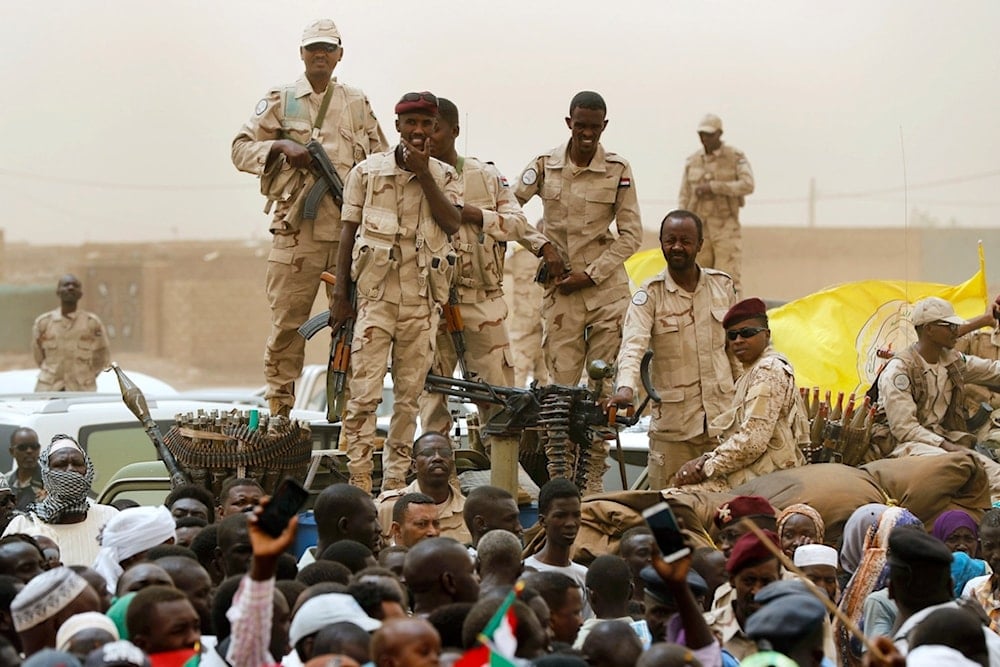Guterres urges ceasefire in Sudan during holy month of Ramadan
The UN Secretary-General urges a ceasefire in Sudan, while Deputy British Ambassador James Kariuki declares a draft Council resolution.
-

Sudanese soldiers from the Rapid Support Forces unit stand on their vehicle during a military-backed rally, in Mayo district, south of Khartoum, Sudan, Saturday, June 29, 2019. (AP)
Warning that the humanitarian crisis in Sudan is reaching "colossal proportions", UN Secretary-General Antonio Guterres called on the warring parties to agree to a ceasefire during the holy month of Ramadan.
"In just days, the holy month of Ramadan will commence. So from this chamber today, I am making an appeal. I call on all parties in Sudan to honor the values of Ramadan by honoring a Ramadan cessation of hostilities," Guterres told a Security Council meeting on Thursday.
On his part, Deputy British Ambassador James Kariuki declared a draft Council resolution urging an "immediate ceasefire before the holy month of Ramadan and urging all parties to allow for unhindered cross-border and cross-line humanitarian access."
Kariuki further stressed that he hoped for a vote later on Friday.
Sudan at risk of becoming 'largest hunger crisis' amid war: WFP
A warning by the United Nations' World Food Programme on Wednesday said that Sudan's almost year-long war "risks triggering the world's largest hunger crisis."
The war between army chief Abdel Fattah al-Burhan and his former deputy, Mohammed Hamdan Dagalo (Hemedti), who leads the Rapid Support Forces, has left tens of thousands dead and more than eight million displaced from their homes, making it the world's largest displacement crisis.
WFP executive director Cindy McCain said that "millions of lives and the peace and stability of an entire region are at stake," adding, "Twenty years ago, Darfur was the world's largest hunger crisis and the world rallied to respond."
"But today, the people of Sudan have been forgotten."
WFP highlighted that it cannot reach 90% of those facing "emergency levels of hunger," noting that only 5% of the population "can afford a square meal a day."
It mentioned that in South Sudan, where 600,000 people from Sudan have fled, "families arrive hungry and are met with more hunger," and one in five children are malnourished.
Two weeks ago, authorities loyal to the Sudanese army blocked aid deliveries to the Darfur region, one of the most affected regions by the war, a move decried by aid workers and the US.
For over two decades in Darfur, the Rapid Support Forces (RSF) have employed the "scorched earth" war tactic, involving the deliberate widespread destruction of property and resources. Currently, the RSF has captured four out of the five major cities in the region.
The blockage of aid would have detrimental effects on Darfur, which is already struggling. An international aid worker told AFP that "Children and babies are already dying from hunger and malnutrition. There will be an immense human impact... and quite possibly large-scale mortality rates."
Sudan's Health Minister Mohammed Ibrahim confirmed at the same time that over 10,000 cholera cases have been detected in Sudan, in 12 of Sudan's 18 states, with the number of cases reaching 10,800.
Although a vaccination campaign against cholera was launched last November and December, Ibrahim said that due to security problems, the outbreak of the disease could not be contained.
Read more: Sudan gov. to open humanitarian aid routes amid risk of hunger crisis

 3 Min Read
3 Min Read








